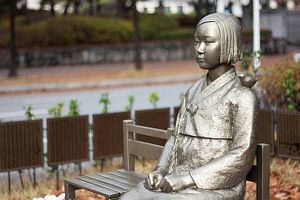Earlier this year, Japan withdrew its ambassador from South Korea. The withdrawal came a year after the governments of both countries came to an agreement over the issue of Japan’s wartime sexual slavery of Korean women — known euphemistically as the “comfort women.” The 2015 deal, described as “final and irreversible,” wasn’t primed for public adoption, especially given attitudes toward Japan and the issue in South Korea.
Tokyo quietly restored its envoy to Seoul earlier this month, but the bilateral tensions between these two countries — both U.S. allies mutually concerned about an increasingly bellicose North Korea — remain high. For instance, according to Japan’s Asahi, in a recent survey asking respondents from various countries whether they trusted Japan, only 13.8 percent of Koreans said they trust Japan. The results comport with older public opinion data out of South Korea, where just a few years ago an Asan Institute for Policy Studies survey found Japanese Prime Minister Shinzo Abe rated below North Korean leader Kim Jong-un in the eyes of South Korean respondents.
Both South Korea and Japan continue to cooperate trilaterally with the United States over the North Korean issues. The three countries between them have agreements to share intelligence on developments regarding North Korea’s missile programs and collaborate on missile defense. All three of their navies have carried out ballistic missile defense exercises over the past year, focusing increasing interoperability and sharing intelligence, surveillance, and reconnaissance at sea. Despite this, the challenges in the Seoul-Tokyo bilateral remain very real. The United States remains a reluctant broker; significantly, in 2014, then-U.S. President Barack Obama presided over the first in-person encounter between Abe and former South Korean President Park Geun-hye.
Beyond the “comfort women” issue and broader public mistrust, there is also the question of the territorial dispute over Dokdo/Takeshima (also known as the Liancourt Rocks). On Tuesday, South Korea registered its “strong complaint” with Japan after Tokyo renewed its claims to the island. South Korea administers the islands, which sea in the Sea of Japan between South Korea’s eastern coast and the northern coast of Honshu.
For now, a lot will hinge on the outcome of South Korea’s upcoming presidential election on May 9 as well. Moon Jae-in, the liberal front-runner from the Minjoo Party, has called on the 2015 comfort women agreement to be entirely renegotiated. Additionally, Moon’s North Korea policy may prove divergent with Tokyo and the United States, possibly introducing renewed tensions in the bilateral. As South Korea heads toward its next election, watch for changes in this important Northeast Asian bilateral.

































